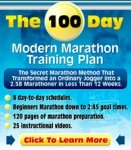So, How Do I Find My Maximum Heart Rate ?
The Three Ways of Finding Your Maximum Heart Rate.
Knowing your maximum heart rate can benefit you in your training and help you determine your heart rate training zones. Training according to this means better results with less training. For 5ks, 10ks or the marathon races.
There are several ways you can find your max HR. Let me explain three main ways.
First, an endurance test to actually get to your maximum heart rate HR. You must be training 2 - 3 times a week and should be healthy to do the test below.
Second option is a a sub max test. I will explain the best one out there.
Or, the third way, to calculate it from a formula.
So we have :
- The max test
- The sub max test
- The formula ;)
Alright, let us start with the first option :
 Actual Max HR Test. The 5 Minute Test. Find a Hill and Go For It. Actual Max HR Test. The 5 Minute Test. Find a Hill and Go For It.
The test below is the one I have found the most accurate for runners. You find a hill that is not too steep. Or set the treadmill on 3-5 degrees incline.
 If you think your max HR is about 200 (most have an idea). If you think your max HR is about 200 (most have an idea).
This will be sort of your target.
Now. Warm up for 15 minutes, very easy.
The test is a five minute run that goes like this :
Start off the first minute and try to run it at 40 heartbeats below target.
Target in this example is 200. So we start off at 160 in heart rate. No faster.
After one minute at 160, go up 10 beats and do one minute at 170 in heart rate.
You have a gradual increase from 160 and up to 170. No sudden "bursts".
After one minute at 170, up another 10 beats to 180.
Stay at 180 for one minute, before hitting 190 for one minute.
After the minute at 190, the last minute go all out. Which means you run as hard as you can, even a sprint in the end if you manage.
To make a summary :
- Calculated max = 200
- 1 minute at 160
- 1 minute 170
- 1 minute 180
- 1 minute 190
- 1 minute all out....
And you have your maximum heart rate !
Point is : the test lasts five minutes. Of continuous running. You increase 10 beats every minute and end up close to where you "think" your max is.
This was the max test.
If you are already marathon training, you should have no problem dealing with this test. Now, over to the sub maximum test.
 Sub Maximum Heart Rate Test."The Foster Sub Maximal Heart Rate Test" To Find Your Max HR. Sub Maximum Heart Rate Test."The Foster Sub Maximal Heart Rate Test" To Find Your Max HR.
This is an excellent test, published by Dr. Foster of University of Wisconsin. In this test you do not have to go really hard to calculate your heart rate.
 Warm up for 5-10 minutes Warm up for 5-10 minutes
Start walking/running at a heart rate of 120 and continue for 2 minutes at this heart rate.
1 min and 30 seconds into the 2 min, say the Pledge of Allegiance out loud (or any kind of verse/song you know by heart)
Then.
Move up 10 heart rate beats from 120 to 130.
At the heart rate of 130 : Do the same Pledge of Allegiance again 1.30 out into your second 2 min.
Continue doing this (up 10 beats every 2 min and speak out load every 1.30 min) and ask yourself every time you talk out loud:
"Can I speak comfortably".
 There are only two real answers ; either YES or UNCERTAIN. There are only two real answers ; either YES or UNCERTAIN.

Continue going up 10 beats each 2 min until you get to "uncertain".
Record your heart rate at this stage.
To calculate your max heart rate from this,
- Take the "Uncertain" heart rate.
- Are you in poor shape, add 50 beats to this
- Are you in average shape, add 40 beats to this
- Are you in excellent shape, add 30 beats to this
- Are you in competitive athletic shape, add 20 beats to this
This is a great way to find your heart rate if you are not already in good training.
Or maybe just starting up your marathon training schedule.
 Your Third Choice : What About Using Formulas To Determine Max HR? Your Third Choice : What About Using Formulas To Determine Max HR?
This has been discussed a lot. And studied.
Here is the deal : The most used formula is the 220 and subtract your age from 220.
So if you are 40 years old, that would give you a max HR of about 180. (220-180)
In 2002 they did some research at the University of New Mexico and took 43 (!) different formulas and tested which one was the most accurate.
The result ?
This formula beat the rest :
- Multiply your age with 0.685.
- Take 205.6 and subtract the result of 0.685 * age.
- And you got your max heart rate pretty accurate.
As an example :
for a 35 year old, that would mean : 205.6 - (0.685 * 35) = 182 in max heart rate.
Good luck with finding your maximum heart rate!
If you feel read for some heart rate training zone information, please click in the menu below. There you will have all five heart rate training zones explained. Click here to read about heart rate training zone 1, of the 5 zones.
|
 Enter email address to subscribe for monthly updates and tips. I will not spam your account, only occasional relevant information :)
Enter email address to subscribe for monthly updates and tips. I will not spam your account, only occasional relevant information :)


 If you think your max HR is about 200 (most have an idea).
If you think your max HR is about 200 (most have an idea).  Warm up for 5-10 minutes
Warm up for 5-10 minutes